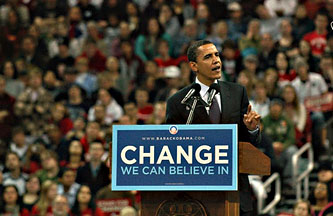Yesterday I suggested that Barack Obama hadn’t done as much as he could over the past couple of years to move public opinion in specific liberal directions that would help his legislative agenda. Jonathan Bernstein, after noting correctly that Obama’s strategy on healthcare reform has basically  been to coopt and bribe all the major players, says this is not just a legislative strategy, but also a strategy for moving public opinion among centrists and independents:
been to coopt and bribe all the major players, says this is not just a legislative strategy, but also a strategy for moving public opinion among centrists and independents:
John Zaller tells us […] that public opinion is led by elites, and that people basically are ready and willing to adopt the opinions of those they like and respect, while they are pretty good at ignoring and rejecting what they hear from those they don’t like and don’t respect.
Loose partisans and true independents aren’t ideologues and are unlikely to become ideologues. What you probably can do — what Reagan probably did — is to teach them, if they like you, to say that they’re “conservative” or “liberal” and to adopt a handful of public policy positions that you advocate….But you don’t do that by reasoning with them, or with inspiring them with great speeches. You mostly do that, as crude as it sounds, by winning. You do it by creating winning coalitions that put Establishment People on your side.
….The convincing doesn’t happen, either in the short term or the long term, from presidential eloquence. The convincing comes when, for example, you’ve been a Republican main street AMA member all your professional life, and you suddenly find that the AMA is supporting health care reform while the Republicans are attacking the AMA. Even then, you may still be resistant to Obama…until you start hearing him saying the things that you’re reading in the AMA newsletter (or however the AMA communicates with doctors. I don’t know).
Now, there’s no question that Obama and the Democrats in Congress are doing this. They’ve basically coopted the insurance companies, the AMA, big pharma, AARP, and corporate interests by giving away goodies to all of them. This isn’t exactly the Schoolhouse Rock version of how a bill becomes law, but it’s certainly the real-world way. And it works pretty well as long as you can get the coalitions to stick together and keep the bribery from stinking up the joint too badly.
But does this actually move public opinion at the same time? Maybe! The mechanism here is certainly plausible, and not one that I’ve paid a lot of attention to in the past. I’ll put it in the back of my mind and give it some thought.
There’s no question, though, that winning is indeed a powerful aphrodisiac. Healthcare reform might be controversial right now, but if Obama gets a bill onto his desk and signs it, it will become a huge triumph almost overnight. Support for both the bill and for Obama will rise steadily, and Democrats of all kinds will reap the benefit of being seen as tough enough and savvy enough to get it passed. This is the fundamental reason that I’m optimistic about healthcare reform. Every Democrat in Congress knows that if reform fails, they’ll be viewed as losers and they’ll pay the price at the polls in November. They have to pass something if they want to remain in power. That’s a prospect that concentrates the mind powerfully.

















